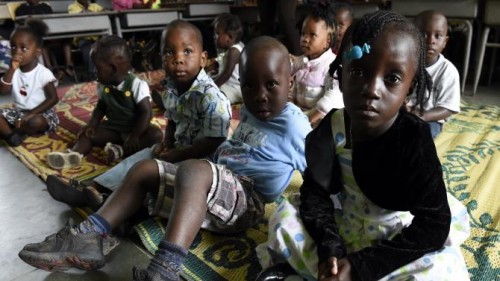Orphans of Ebola Are Being Ostracized by Cautious Relatives
Share
Explore Our Galleries
Breaking News!
Today's news and culture by Black and other reporters in the Black and mainstream media.
Ways to Support ABHM?

Children in a nursery while their parents are away at church on Sept. 28, 2014, in Monrovia, Liberia.
BY: DIANA OZEMEBHOYA EROMOSELE, theroot.com
As of press time, the first Ebola victim had been diagnosed here in the U.S.—and approximately 3,000 people have died because of the Ebola outbreak in West Africa, but what has been neglected and underreported are the children the dead are leaving behind. West African orphans, many of them with one or both parents deceased, are being shunned by their surviving relatives who are scared to take them in for fear that the children have contracted Ebola as well, Al Jazeera reports.
“Ebola is turning a basic human reaction like comforting a sick child into a potential death sentence,” Manuel Fontaine, a regional director with UNICEF, explained.
“These children urgently need special attention and support; yet many of them feel unwanted and even abandoned.”
UNICEF is making it its mission to tend to the people who are infected with the virus and also their families who are indirectly affected as well. The agency has asked the international donor community for $200 million in that regard. A quarter of that ask has been met.
The U.S. has taken the lead in the global effort to put a stop to the epidemic. Of the 3,000 troops that President Barack Obama said he would send to the region to help coordinate the emergency-response efforts, 150 were dispatched Tuesday.
“We are supporting U.S. government and international relief efforts by leveraging our unique U.S. military capabilities,” said Gen. Martin E. Dempsey, Pentagon’s chairman of the Joint Chiefs of Staff.
Al Jazeera reported that a recent U.S. Centers for Disease Control and Prevention report warned that the number of Ebola infections will double every 20 days if response efforts don’t ramp up.











Comments Are Welcome
Note: We moderate submissions in order to create a space for meaningful dialogue, a space where museum visitors – adults and youth –– can exchange informed, thoughtful, and relevant comments that add value to our exhibits.
Racial slurs, personal attacks, obscenity, profanity, and SHOUTING do not meet the above standard. Such comments are posted in the exhibit Hateful Speech. Commercial promotions, impersonations, and incoherent comments likewise fail to meet our goals, so will not be posted. Submissions longer than 120 words will be shortened.
See our full Comments Policy here.